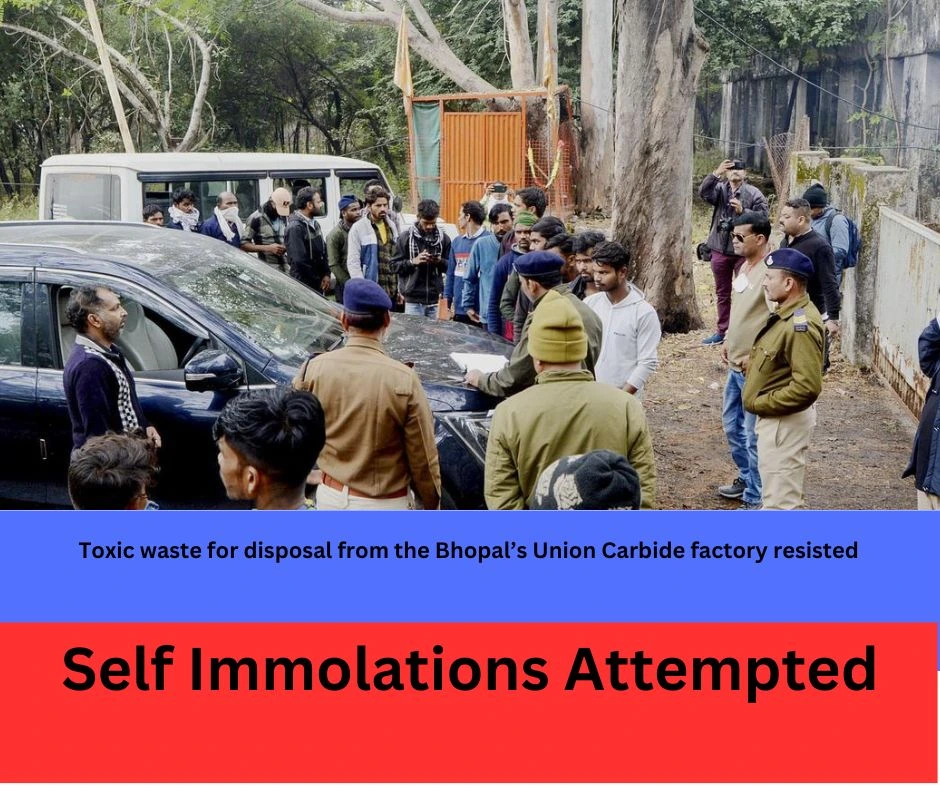In a dramatic turn of events, Pithampur town in Madhya Pradesh witnessed heightened tensions on Friday as protests erupted over the planned incineration of toxic waste from the infamous Bhopal gas tragedy. The unrest led to the imposition of prohibitory orders and the registration of five cases against demonstrators opposing the disposal, officials reported.
The toxic waste, approximately 337 tonnes from the Union Carbide factory, was transported to Ramky Enviro’s Industrial Waste Management Facility in Pithampur, about 50 kilometers from the Dhar district headquarters. The waste had been awaiting disposal for over 40 years since the 1984 Bhopal gas tragedy, which remains one of the world’s deadliest industrial disasters.
The arrival of the hazardous waste in Pithampur triggered large-scale protests, with around 500-600 residents marching toward Ramky Enviro’s premises. Demonstrators, organized under the banner of the Pithampur Bachao Samiti, expressed grave concerns about potential health and environmental risks. The agitation intensified, forcing local authorities to invoke prohibitory orders under Section 163 of the Bharatiya Nagarik Suraksha Sanhita (BNSS), which bans the assembly of five or more individuals in the area.
Superintendent of Police (SP) Manoj Kumar Singh confirmed that five separate cases were filed on Friday night. These cases, registered at the Pithampur Sector-1 police station, include charges under several sections of the Bharatiya Nyay Sanhita (BNS), such as rioting, unlawful assembly, obstruction, and public endangerment. Some cases named specific individuals, while others were filed against unidentified persons.
The protests took a distressing turn as two individuals attempted self-immolation during demonstrations in different parts of the town. Quick intervention by onlookers prevented the acts, and the individuals were rushed to a local hospital for treatment. Meanwhile, the Pithampur Bachao Samiti called for a town-wide bandh, amplifying the unrest.
Despite the turmoil, officials reported that normalcy had returned to Pithampur by Saturday morning, with industrial operations continuing without disruption.
Madhya Pradesh Chief Minister Mohan Yadav chaired an emergency meeting on Friday night to assess the volatile situation. Following deliberations, he announced that the state government would halt further action until the courts reviewed the matter. Yadav emphasized that the transportation of the toxic waste adhered to safety protocols in line with Supreme Court directives and High Court orders, which mandated the waste’s arrival at the designated facility by January 4.
“The government is committed to ensuring public safety. If there is any perceived threat or fear among residents, we will present this issue before the court and await further directions before proceeding,” Yadav assured.
The Long Shadow of the Bhopal Gas Tragedy:
The toxic waste being disposed of in Pithampur is a grim reminder of the Bhopal gas tragedy, which claimed thousands of lives in 1984 due to a gas leak from the Union Carbide factory. While efforts to clean up the site have been ongoing for decades, the disposal of the hazardous waste remains a contentious issue, often igniting public fear and resistance.
Environmental activists have long voiced concerns about the potential risks associated with transporting and incinerating such waste. They argue that inadequate safeguards could expose local populations to health hazards and environmental degradation.
As the government navigates the legal and public challenges surrounding the waste disposal, the spotlight remains on Pithampur and its residents. With the courts set to weigh in on the matter, all eyes are on how the administration balances environmental safety, public health, and compliance with judicial mandates.
For now, the people of Pithampur await clarity, united in their demand for transparency and accountability in managing one of India’s most enduring industrial legacies.




